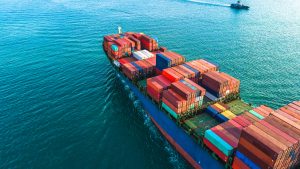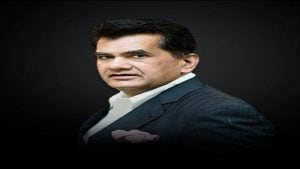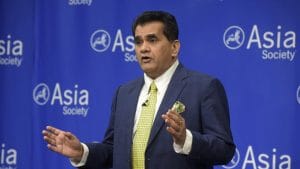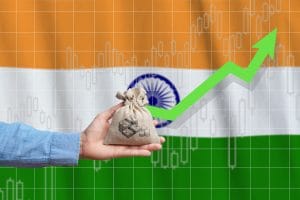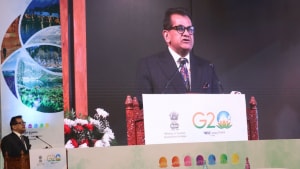India needs to scrap old labour laws, make infrastructure more accessible to create large scale companies, says Amitabh Kant

KV Prasad Jun 13, 2022, 06:35 AM IST (Published)
 Listen to the Article (6 Minutes)
Listen to the Article (6 Minutes)
Summary
Amitabh Kant, India’s G20 Sherpa, recently spoke during the launch of his book titled “Made in India: 75 Years of Business & Enterprise.” Kant stressed the importance of Indian companies penetrating global markets and having the size and scale of manufacturing needed to succeed in those markets.
India’s G20 Sherpa and former NITI Aayog CEO Amitabh Kant on Friday stressed the need to scrap old labour laws, decriminalise them and make infrastructure far more accessible to ensure Indian companies penetrate the global markets and succeed in scale and size.
Speaking during the launch of his book Made in India: 75 Years of Business & Enterprise, Kant emphasized that the growth of MSMEs (Micro, Small, and Medium Enterprises) in India is contingent upon having very large companies.
During the book launch event, Kant also talked about India’s potential in the field of green hydrogen. According to him, green hydrogen is the area where India has the potential to become a world leader. Today, the cost of producing green hydrogen is $4.5 per kilogram, but Kant believes that India has the potential to bring it down to $1 per kilogram. Achieving this would require significant investment in technology and infrastructure.
Also Read: Amitabh Kant: Centre did its bit, now states need to buck up
Here are excerpts from a panel discussion at the book launch which also had N Chandrasekaran, Chairman of Tata Sons, Uday Kotak of Kotak Mahindra Bank and Falguni Nayar, founder and CEO of Nykaa, hosted by CNBC-TV18’s Shereen Bhan.
Q: How do we actually get India to export more, how do we get India to take more share of global trade? In your book you address the issue of the fact that we only got a handful of large conglomerates, so how do you ensure that that number moves up? How do we ensure that we have thousands of scale enterprises and not just small enterprises because that is going to be responsible for the kind of growth aspirations that we have?
Kant: If you look back at the years when India has really grown and India has grown at 8-9 percent for four to five years, but it hasn’t grown for decades like other countries have done. However, every time we have done that, it’s because our exports have grown. So exports are the key to growth. And that really means that you need companies who will penetrate global markets, you need size and scale of manufacturing. And that’s why we brought in the PLI scheme.
The production linked incentive scheme was very simple. Many people mistake it for subsidy, it’s not. It says we want you to every year keep raising your production. You fix your targets and achieve them. If you don’t achieve them, you don’t get it. But in five years’ time, it gives you the opportunity to become global in size and scale. And once you have companies of that global size and scale, you will have tier-II manufacturers, tier-III manufacturers, like Maruti came in and then all these MSMEs came in the automobile sector because of Maruti, it’s an automatic backward-forward linkage.
Therefore you need large companies for MSMEs to flow. I mean MSMEs will grow if you have very large companies and then they will penetrate global markets. It’s very important. So I think for large companies to also happen in India, we need to scrap a lot of labour laws which were made a long time back, we need to decriminalize a lot which the Prime Minister is pushing for, you need to make your infrastructure far more easy because your logistic costs are high, that’s what Gati Shakti is doing. So a lot of that work is in action right now.
I think in the next 2 to 3 years, you’ll see India becoming more and more efficient in many of these areas to enable large scale and size. Look at the sectors where India has the potential. I think to my mind, green hydrogen is the area where India has the potential. Today the cost of producing green hydrogen is $4.5 per kilogram. India is the only country which is climatically blessed, it has top class entrepreneurship, it is possible for it to bring it down to $1 per kilogram. You can be the biggest producer and exporter to the world, but it will not happen without size and scale. So size and scale is really the key to it.
Q: At the Delhi launch of the book, external affairs minister said India is uniquely positioned, uniquely poised, but let’s not go around looking for the China fix of efficiency. If we don’t go looking for the China fix of efficiency, what is the India Fix going to be over the next 25 years?
N Chandrasekaran: It’s definitely a very, very unique opportunity for India for multiple reasons. There are three transitions and there are moving geopolitical situations. From the transition’s point of view, the first is digital and AI, second one is energy and third one is supply chain. In all the three transitions, I would say that India is probably the best placed country in the world.
First on the digital. Just two primary reasons. First, there is no country in the world which has demonstrated a large scale digital intervention and digital platform for public services delivery, which is transformative at scale, whether it is the UPI, Aadhaar or the Jan Dhan Yojana, we can go on an on.
The second thing on the digital side is it’s no secret that we have the best talent available from a digital point of view for the future. The scale and the depth that India has, again, it is unparalleled. You can add all the talent that’s available from next 10 countries but still they will fall short. So these two are big tail winds.
If you take the energy transition, India is probably the only country in the world which has to achieve the energy transition, purely only accounting for growth. Most other people, whatever be the country you take, their energy transition to renewable or new energy, what have you has to be substitution. Whereas in India, if whatever be the doubling, tripling, whatever is the GDP number you take by 2047, the needs of growth that we have between now and 2047 or 2050 is at least three times more than what we have.
And all of this will be new energy and we will do renewables, we will do wind, we will do solar, we will do 10 other technologies and that is a unique opportunity because with growth, you can fix anything. Priority should be growth, growth, growth.
And when you do something for growth, you are not so much under stress like when you do it for substitution.
Thirdly, the global supply chain is going to be rebuilt and it is being rebuilt as we speak. It is not that it is going to happen, it is happening. We are in the middle of that. Any supply chain is an ecosystem play. So I keep referring as India plus, I never use any other example of saying that we are replacing somebody, we are not replacing anyone. We have an opportunity to create a global alternative supply chain base, which I call it as India plus because India can’t do it alone. However just the sheer size, scale and everything else that we have positions India to be the lead in this alternative supply chain, somebody else cannot take the lead, it has to be India and India is taking the lead and the supply chain will get built over the next 10-30 years.
But above all of this, under the leadership of Prime Minister Modi, what has fundamentally changed is the belief and the aspiration of every Indian and every sector. You can feel it in the urban, you can feel it in the rural, you can feel it in poor people, rich people educated, uneducated, it is there everywhere.
As a country, we had the audacity in the middle of the COVID — when every other nation was going after Pfizer and Moderna, which normally we would have done how to find the money, run helter-skelter to see how to get Moderna Pfizer or which country we can import from, instead of all that to say that we will build our own vaccine in the middle of a crisis, there is something to be said about that.
So this whole Make in India, started as a campaign or a slogan. The slogan became a movement, movement became a belief and now we are in the execution phase. So I really believe that we should give ourselves the chance and we had to make bets. We have to take risks. Everything we do will not work, but it’s ok.
Q: You know, you’re right in pointing out that we are currently in the execution phase as far as Make in India is concerned. And in your words, the global supply chain is being rebuilt and India stands to gain from that rebuilding, so to speak. But you straddled both software services, which is where you spent a large part of your career and now outside of that as well, that has been the big India growth story that has been our engine of growth for several decades now, the aspiration of becoming the factory floor of the world, how easy or challenging will that be?
Chandrasekaran: Nothing is easy in life. All the business people will tell you that to make Rs 100 crore profit, even to become EBITDA positive is not easy. So we are not doing these things because something is easy. And if you are doing easy things, why we will succeed, everyone else will do the same thing. So I think we have to do things where we have a chance.
What is going for us? The geopolitics is going for us. It’s clear the current geopolitics, I think we are uniquely positioned and this will last for a few years. I don’t know, it will last for three years, five years, six years, I don’t know. And you cannot miss the moment.
So the geopolitics allows you to form partnerships – technology partnerships, finance partnerships, supply chain partnerships, customer supplier partnerships, all this is possible because the timing is there.
Second, we have the talent, yes, they are not skilled. We are putting together a complete value chain in the electronics. We are doing the precision manufacturing now. We are slowly moving into packaging, assembly, then getting into semiconductor testing, then we had to put a fab design, then eventually to vertically integrate, we had to put a fab – that’s the whole chain.
We have a lot of skills in India on the fab design, but we don’t have skills in precision manufacturing and it’s hard work. Some of us are working on a quality model also, but we have scale. So if we have the vision to do this, time is now, money will come.
While I am not going to say that it’s easy to get $10 billion-$50 billion, but money is available once you have the right project and right management team.
Q: Everyone is talking about how we can double as an economy by 2030 and so on and so forth. One issue I think we need to be mindful of and I think Amitabh Kant mentions that in his book very specifically, is let’s not get carried away with five to number three in the world, but let’s focus also as far as per capita is concerned and there is a big difference there, there is a big difference between us and some of the countries that we just spoke of. The other issue is the issue of financing. We have this aspiration, what will it take to finance this aspiration? Where will the financing come in from? And what do you believe will need to be done in terms of capacity and capability building specifically from that perspective?
Uday Kotak: Congratulations to Amitabh Kant, I think it’s a fantastic book. If you read the whole book, you must not miss the last chapter. The last chapter is about our future. It reminds me of a simple line- let’s not keep the baggage of history but learn from the lessons of history. And that’s in my view, what Amitabh Kant’s book highlights.
I have seen Amitabh in his own career, he has always explored the art of the possible and he is now mastering the science of execution because both going together is what is going to make it happen.
India stands out as one of the most stable financial systems in the world today. I want to publicly congratulate the RBI and the government for an outstanding job of making India stand out.
When I look at every night or every morning, one more bank in the US is in trouble or somebody in Europe is in trouble, I say we’ve got something right. We have got our act together, we have created a stable financial system, well capitalized and it’s a goldilocks time – lowest non-performing assets, clean credit, reasonable growth in the book, and none of these risk issues like we are seeing in the developed nations. So I genuinely feel very good about the stability and the solidity of the Indian financial sector.
Having said that taking a cue from Amitabh, where do we go from here? And how do we take this wonderful situation we are in? I think we need to be feeling good about ourselves, but always introspecting, what is it that we can do better? So if I think about capacity building in the financial sector, we really need to get some of the important guardrails in place. I think the concept of IBC was a great concept, it really was the basis of creditor being in control but I think there is work to be done. I think we really need to fix the judicial system which is consistent with a bankruptcy law because at the end of the day, if banks lend money, we must be able to recover the money. If we have a problem there, it constrains our ability to take better risk.
In the same context, I think we must now get this balance right between the needs of the corporate sector.
When N Chandrasekaran tells me that he wants to buy a Rs 50,000 crore company in India, I will have to tell him, please go to a foreign bank and get it funded outside because I cannot fund you in India. If we have to grow forward I think these are risks, I think Indian banks have to be able to understand and manage these risks like acquisition financing, project financing. We got into trouble on infrastructure financing. If you look at 2008 to 2018, it was a year when we did not get infrastructure financing right and banks took the wrong risks because the guard rails of the system were not in place. Therefore, we need a unified well-coordinated system.
I do believe India has the brain power and the risk management to be able to manage a financial sector which meets the aspirations of all of India’s growth as we go forward.
Q: Has N Chandrasekaran been talking to you about making a Rs 50,000 crore acquisition?
Uday Kotak: N Chandrasekaran doesn’t talk anything below Rs 100,000 crore.
Q: As you look at where we are today and as the landscape plays itself out, what are the big bets that you’re willing to make on the power of consumption and technology?
Falguni Nayar: I want to go back to the history that everyone is talking about. Being a startup representative, I want to just say that just around the time when Startup India movement started and I think that big photograph of PM Modi on a stage with a lot of startup entrepreneurs gave a lot of credibility to startup businesses.
In 2015, our turnover was about Rs 20 crore and from there, we’ve grown about 300 times and that is what gives us confidence that tomorrow is also there for our platforms. As I travel and meet our brand partners all over the world in beauty and in fashion, what I can say is that they are noticing India and they are noticing power of Indian millennials, power of GenZ, which is coming of age and they are very excited about what India has to offer.
I think India is becoming one of the top markets for all these players. And I’m convinced that the next decade will be the decade for Indian consumption. Obviously consumption is driven by income, so first incomes have to go up. But I’m very confident that the young India with the power of their enterprise will take India into a generation where both income and consumption will grow.
Talking of the platforms, I think Chandra already said that we are very aware that our platforms are some of the best in the world. When we meet against these, these global partners, they compliment us for having one of the best platforms. It’s not just about coming from India, but it’s in the world one of the best platforms are coming out of India because of the sheer talent that is available and ability to do complex task.
So I think if we were to marry technology with problems that we need to solve in the country, which is what most of the startup entrepreneurs have addressed, I think the sky is the limit in terms of driving our Indian consumption and attracting many of the global players to come into India to address those markets.
Of course, that doesn’t mean we can’t export. So beyond that, we would of course like to dream how we can take our Indian brands into global markets.
Q: Whether it’s banks, world-class and world-size banks, which is what you were talking about, or it is world size and world-class companies that are exporting to the world, and of course, he highlights the Korea example several times over in the book to make that point. What will it take for us to be able to build size and scale, this missing middle has been one of our perennial problems, how do we address that? Are we at an inflection point of being able to address it?
Kotak: I think the mindset is positive. The mindset is about reform, taking the country forward. What we need to keep in mind is that as we go down this, we want many, many cars to run on the roads. And the more the cars are, the risk increases, there is of course, risk of accidents along the way. The answer to that is for us to get better road regulation, get our systems, our signals and all that in place. Rather than taking an approach that we have taken historically. Because there are accidents we don’t want so many cars on the road. Let’s encourage more cars, let us encourage and build more roads, traffic and congestion is an inevitable part of it, we will manage it. But we will have to take the risks of potential accidents along the way and manage those accidents, rather than saying we don’t want accidents.
Q: You have talked about bets and risks. What are the big bets and big risks that you are willing to make at this point in time?
Chandrasekaran: We were already doing a number of things, we are doing huge transitions in automotive, we have pivoted to electric vehicles, we have pivoted to fuel cell in commercial vehicles, then renewable power, both size and transition we are doing. We are working on carbon capture. We are putting together the electronics vertical, we are putting together the mobile telephony infrastructure, whether it’s 5G, 6G, and 6.5G. They are getting into batteries, lithium batteries, so I think we will do whatever is needed. And whatever we can do, we will do.
However, the point fundamental point is the opportunity is huge. If India has to realise its potential, forget about whether we will grow 6 percent 6.5 percent- 7 percent – it is good for some headlines every other week. I think the opportunity is even double-digit. But that doesn’t mean that it’s easy.
I think what opportunity is not there – you take consumption. I think the trends are very clear. India is becoming a formal economy. The aspiration of the people is increasing, the per capita income is going to increase. The affordability for spending is increased and then once we cross – I think there is enough theory that the 3,000 mark, once it crosses, then you see a hockey stick in consumption. Whether it is $3,000, or $3,500 we don’t know.
But at the same time, we have a lot of disparity, one state is at $8,000 and another state is $800. So, we got to figure out a way to fix it, if you want to really capture the true power of consumption.
The second thing is demography, I think Amitabh Kant talked about age and so on so forth. So we have got do skilling, and we have to do 21st-century skilling. We have to differentiate between what is industrial skilling we need to, and what is digital skilling we need to do.
Similarly in the whole infrastructure, B2B side all these industries, everywhere there is so much growth opportunity. But it’s going to be a lot of hard work. It is going to be a little bit chaotic. Because order doesn’t come and Indians by general we like clarity out of chaos. So we will come through, but the point is we have to work at it.
Q: Let us address one of the issues because Mr. Kant brought up the demographic advantage and I think that gets held up very often, it is one of the critical advantages that India enjoys as the world ages. But where will the jobs come from? Skilling is one aspect. But where will the jobs come from? Especially as we are now talking about AI being the next disruption in India, leading in the AI war, and so on and so forth, where do you create the jobs for this demographic?
Chandrasekaran: I want to, first of all, tell you that the creation of all these industries are going to create a very strong MSME ecosystem. India needs 100 million jobs, and probably now 90 million jobs, whatever is the number, all of this is not going to come from big companies. So it’s going to come across sectors. There is going to be a huge amount of jobs that’s going to come in the consumption, hospitality, healthcare, and services sector can explore. The services sector, not only for India, and for the rest of the world.
There will be a remote healthcare, services sector, which in my opinion, can be another IT industry. Okay, if you are creating 10 million jobs and 10 or 15 million jobs in IT, but BPO, we can create a similar number of jobs in the healthcare sector, that is a potential. Will it happen tomorrow, it will not happen tomorrow? Will it happen over the next 10 years? Yes.
The hospitality sector is a big thing. Entire MSME ecosystem, if you are going to develop an electronic semiconductor base, the number of companies you will create is just enormous. Each of those companies will have 50, 100, 150, 200 people. And all of this will mushroom, wherever these companies are housed, all those companies will come.
There is no reason for the electronics manufacturing semiconductor, not to repeat the IT industry, why not. We can repeat the whole model again, it’s just not that it is exactly a copy of the same thing. But the potential is the same thing because the world needs it. The world is going to need chips. There will always be volatility, this year they will say, no, no, now there is a glut. But it will change because there is no way technology and chips are going to disappear. So I think the opportunity is there, but it’s just that we try to capture it in one spreadsheet, it is not possible.
Q: Speaking of capturing in spreadsheets let us address this issue with you as well. Chandrasekaran was talking about the opportunity of creating another IT services sector in India, it could be remote health, for instance, as an example that he held up? This aspiration, of moving from having been the back office of the world and that is the experience that we have had for over two decades now and we have delivered on that successfully, to being the front office of the world, and the potential that that holds up?
Kotak: COVID has opened our eyes to the new vistas of opportunity. What COVID did is you could be in any part of the world and virtually operate in any other part of the world. This is India’s biggest opportunity. We have thought about most of our software services as significantly back office. We have to change our mindset that an office for somebody in America is operating out of Chennai, or Calicut. We have got to make that change in our minds. And I think the world is much more open to having a lot more jobs happening from anywhere in the world in the virtual dynamism which we are seeing post-COVID.
COVID has really opened up huge possibilities for India to have the front-end office jobs, combine it with AI and various other opportunities India can be the leading office of the world front or back. We need to take that opportunity now because that’s where Chandra, we can create a lot of jobs. I agree healthcare is another big one. And again, there will be out-of-the-box areas for jobs. Sports, you are talking about IPL, Kabaddi, so many games, sports is going to be the next big thing.
We happen to be as a family, we associated with a Kabaddi team, Kabaddi players who barely had enough subsistence or today making a crore, Rs 2 crores of. Those jobs did not exist. So we have a whole new generation and imagination.
Leisure is going to be a big industry. So let’s not sort of restrict our imagination of the future of jobs. Let us open our vista and we will create a completely new paradigm of opportunities across the board.
Chandrasekaran: Another sector is tourism, and it is a huge sector. So, it is a question of identifying and the devil is in detail; each of these must be mapped and each one of these has huge potential. So, the opportunity is there, but there is no easy picking.
Q: Let us address, some of the other untapped opportunities that we just spoke of. I think one of the things that both we heard from Mr. Kotak, as well as Chandra, was this ecosystem effect, as far as small businesses are concerned. Platforms like yours give air to a lot of private labels, what has been the experience of seeing this ecosystem being created? And where do you see this going? My second question to you is because if India has to grow at 10 percent, or 10 percent plus, which is what everybody here is talking about, it cannot do it without its women. Unfortunately, we have seen a not-so-great trend on that front, whether it’s labor force participation or women in entrepreneurship. I mean, even today to hear you being called out as a woman business leader, I mean, that tells us the story as well, doesn’t it? So what will it take to create this ecosystem of enterprises at the small and medium level that will have access to platforms like yours? And how do we just get more women to work?
Nayar: I will first address the first question and I think, again, small is beautiful is always what I will have to say. If you look at the global supply chain and fashion, the company that is doing well in the US and giving a run for its money to all of the US fashion labels is someone who believes in small lot production that they do in China. And through that, because I think today’s consumer wants a lot of, newness and stuff like that so through that they are addressing the needs of the entire country like the US.
I think India is very well suited for that and I think platforms like ours, what we do is that we have more than 6,000-7,000 brands, and each of them is getting size and scale in India because when you want to become an exporter, the home market size and scale is important. So when you have size and scale in the country, and on top of that aspire for exports, so at least in beauty and fashion, where even small is beautiful, I see a lot of brands coming out of India meeting like about direct to consumer stories.
There are so many brands that have sprung up and when you give, foreign brands run for its money by being as popular as an Indian brand in the country that itself is the replacement of jobs that would have otherwise gone abroad. So I think replacing international production in the country, as well as having a strong base that allows you to export and aspire to export is great.
I personally feel that the MSME component is going to be very strong going forward, thanks to platforms, which will take away a lot of headaches. We say that will take away your supply chain headaches, we will tell you how much you should produce, and how much we will buy. We will take away your sales and marketing headache. So I think that allows them to use this skill on innovation and marketing.
Talking about women, I have always said that I don’t like to compartmentalize women and I personally feel that since women hold half the sky, I won’t be satisfied till I really see equal numbers. So I mean, seeing small numbers is not really worth talking about till we get there. But my only thing is that I think empowerment begins at home. And I would like to see each of the men empowered, closest to their home for women to make progress. With that, I think it also comes from confidence. I am just fortunate to have Nykaa stand for women’s empowerment.
As we started building a brand, a lot of women came up to us and said we really love the fact that you are asking us to dream, because for too long, women have not even dared to dream. I think if they can only dream for themselves, the world will be theirs. So with that, I think we have a long way to go. So with that, I hope for the best.
But I think India has a very fortunate place and this is a very fortunate century decade, whatever you say for women, and it will only be positive from here that also I can predict.
Q: Falguni talked about the ability to dream, and I know that all of you sitting here on this stage have always believed in dreaming big. What’s the next big dream that you have for the bank but more importantly for India?
Kotak: I would love to see a financial institution from India be amongst the top two or three in the world.

Elon Musk forms several ‘X Holdings’ companies to fund potential Twitter buyout
3 Mins Read
Thursday’s filing dispelled some doubts, though Musk still has work to do. He and his advisers will spend the coming days vetting potential investors for the equity portion of his offer, according to people familiar with the matter

KV Prasad Journo follow politics, process in Parliament and US Congress. Former Congressional APSA-Fulbright Fellow



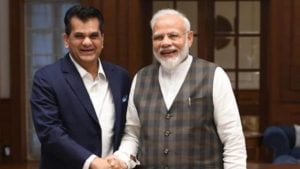






 Listen to the Article
Listen to the Article  Daily Newsletter
Daily Newsletter





